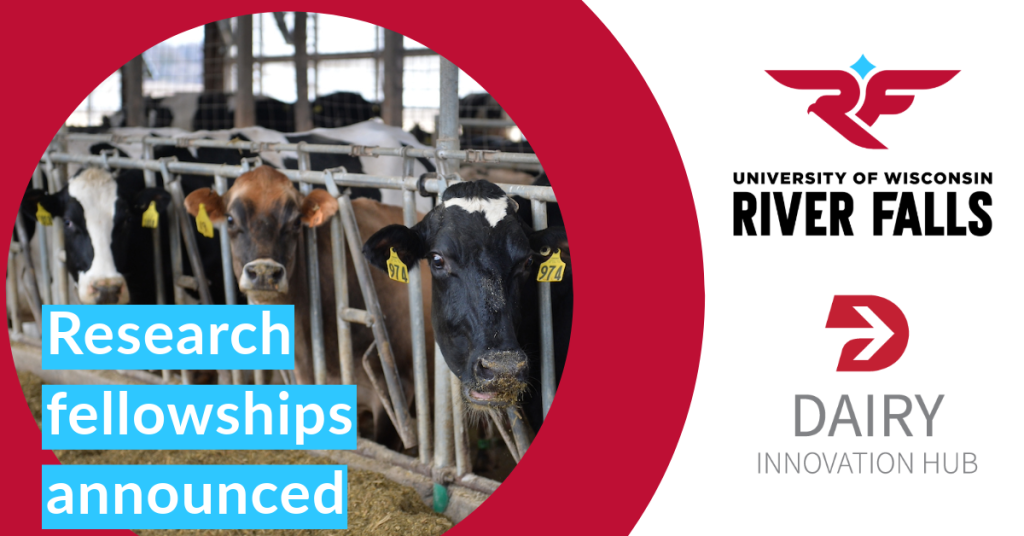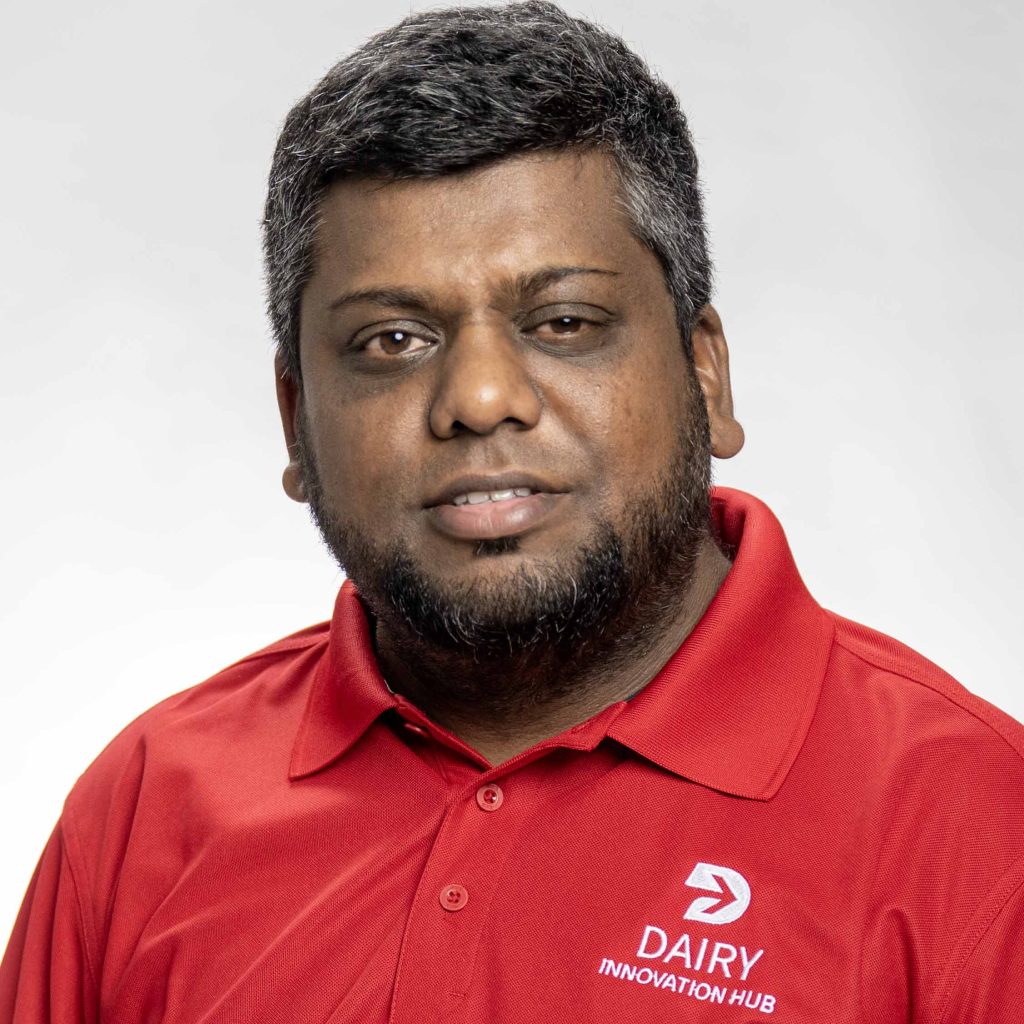
The University of Wisconsin–River Falls College of Agriculture, Food and Environmental Sciences (CAFES) recently awarded four faculty research fellowships to help increase dairy-related research capacity through the Dairy Innovation Hub initiative. The selected faculty members will tackle research projects in the Hub’s four priority areas; stewarding land and water resources; enriching human health and nutrition; ensuring animal health and welfare; and growing farm business and communities.
Funded through a $7.8 million per year investment by the state of Wisconsin, the Hub harnesses research and development at UW–Madison, UW–Platteville and UW–River Falls campuses to keep Wisconsin’s $52.8 billion dairy community at the global forefront in producing nutritious dairy foods in an economically, environmentally, and socially sustainable manner. Since its launch in 2019, the Hub has funded more than 250 projects across the three campuses.
A faculty research fellowship is a temporary position for permanent faculty members. The goal is to provide support for a specific research project and any ancillary costs — including ensuring that the faculty member will have time to conduct the research and support for existing teaching responsibilities.
The following UW-River Falls faculty were selected for funding:
Jill Coleman Wasik, Department of Plant and Earth Science

“Monitoring nutrient and contaminant flux through soils with experimental plots at Mann Valley Farm”
Coleman Wasik is a professor in the Department of Plant and Earth Science at UW–River Falls. Her research focuses on how human activities influence the movement of nutrients and other contaminants through natural environments. She aims to better understand how we can benefit from natural processes while also reducing our impact on these ecosystems.
Project Summary: Groundwater contamination is a serious issue in Wisconsin, affecting both private wells and larger aquifers that supply drinking water to most residents. Some contaminants occur naturally, while others, such as pesticides and nitrates, are introduced through human activities, particularly agriculture. Recent statewide surveys have revealed a growing presence of agricultural chemicals in well water, often linked to agricultural land use. Western Wisconsin is especially vulnerable due to its geology, with shallow bedrock and permeable soils allowing contaminants to seep into groundwater more easily. This project aims to establish experimental field plots to monitor soil and water conditions over time, providing valuable data for researchers studying contamination trends. Understanding how agricultural chemicals interact with soil and water will help guide better land management practices, such as cover cropping and reduced tillage, that could mitigate risks and protect Wisconsin’s vital water resources.
Maria Jose Fuenzalida, Department of Animal and Food Science

“Management and housing practices related to bulk tank milk butterfat and protein concentration in Wisconsin dairy herds”
Fuenzalida is an assistant professor in animal and food science with a focus on milk quality and udder health. Her research is guided by two main goals: to understand the impact of intramammary infection on fertility, milk production, milk quality, and animal health, and to identify effective strategies for preventing and controlling these infections.
Project Summary: Over the years, U.S. dairy farmers have significantly improved milk production and enhanced milkfat and protein levels, key components for high-quality dairy products like cheese. In Wisconsin, where dairy is a cornerstone industry, evolving consumer preferences, such as the renewed demand for whole milk, have prompted farmers to adjust their practices. While much research exists on milk quality, there is limited understanding of how specific management and housing strategies impact milkfat and protein concentrations. Wisconsin dairy farms vary widely in their feeding approaches, herd sizes, housing methods, and technology use, all of which influence milk composition. This project aims to identify and analyze the best practices that contribute to higher butterfat and protein levels, focusing not just on whether farmers adopt these strategies but on how they implement them. By bridging this knowledge gap, this project can help dairy farmers optimize production and inform research-based educational programs that support sustainability and profitability within Wisconsin’s dairy industry.
Md Azhar Uddin, Department of Agricultural Economics

“Feasibility assessment for establishing a Choice and Sensory Evaluation Lab (CSEL) at UW–River Falls”
Uddin is an assistant professor of agriculture economics with a focus on agribusiness marketing, behavioral and experimental economics, health economics and other relevant topics. In addition to his research, Uddin teaches and advises students in ag business, marketing communications, and related programs.
Project Summary: This project explores the feasibility of establishing a Choice and Sensory Evaluation Lab (CSEL) at UW–River Falls to support research, teaching, and industry collaboration. The lab would help Wisconsin’s dairy and food industry stay competitive by providing sensory evaluation and consumer preference analysis, guiding product development, and market alignment. Beyond benefiting industry partners, the lab would enhance student learning by integrating hands-on research in food marketing, sensory science, and consumer behavior. Additionally, faculty research on food choice, market trends, and sensory methodologies would be strengthened through interdisciplinary collaboration. This initiative also aligns with the priority of the Dairy Innovation Hub to support farm businesses and communities by ensuring dairy producers and processors have access to consumer-driven insights, fostering economic resilience. The study will assess infrastructure feasibility, industry demand, commercialization potential, financial viability, and academic integration to determine whether the lab can be a sustainable addition to the university’s resources.
Bob Zeng, Department of Agricultural Engineering Technology

“Dairy Forage Fractionation (DFF) equipment”
Zeng is an assistant professor of agricultural engineering and a licensed professional engineer with expertise in the areas of machinery systems modeling, testing, automation, and numerical simulation.
Project Summary: Wisconsin dairy farms rely on high-quality feed to keep their animals healthy and productive, but current methods for improving forage digestibility are often too expensive or impractical. This project aims to create a Dairy Forage Fractionation (DFF) system that effectively separates parts of forage, like protein-rich alfalfa leaves from fiber-heavy stems or energy-rich corn grain from stover, to improve feed quality and reduce costs. Researchers have designed a concept for the system and are refining it through engineering studies and farm surveys, with initial results showing strong interest but concerns about wet material separation and affordability. The next phase will focus on improving efficiency, analyzing economic benefits, and assessing commercial viability. By combining engineering innovation with real-world farm needs, this project seeks to create a practical solution that supports Wisconsin’s dairy industry and promotes farm sustainability.
